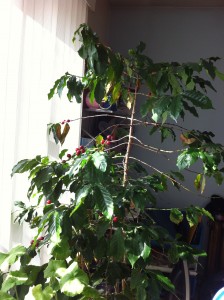
My Coffee Plant
My coffee plant is bearing glossy red beans. I should harvest them soon, but they are so pretty.
The story of this coffee plant is as impressive as that of any immigrant to this Prairie city. It came to me in a tiny burlap sack, as a hostess gift back in 1995 or so. It has adapted and thrived, after its own fashion, although my Kenyan friend shakes his head over it. And now it has borne fruit, a sign of success beyond a doubt.
It’s a dwarf – no taller than I am, at 5 feet nothing, while my friend says it should be much taller. It’s nearly two decades old, yet it bore beans last year for the first time. It lives in a pot in my kitchen for most of the year, near the south-facing window, and for most of the year it just survives – a little droopy, but still valiantly green. In the summer, as soon as we are confident the temperature will not drop below 10C, we put it outside, on the deck. That’s when it really comes to life.
Like my children who come home from camp visibly taller, it has done most of its growing in the summer, when it can enjoy the sun and fresh air. Last year it flowered for the first time, lovely little white blossoms. Luckily for it, coffee plants are hemaphrodites and fertilise themselves. It doesn’t bode well for genetic diversity, but it is probably the only coffee plant in any backyard for miles around, so it does the best it can.
I move in circles where the grandparents came to Winnipeg, often as Holocaust survivors, to stand behind the counters of groceries or pharmacies (and now their feet are paying the price), the parents are doctors, lawyers, social workers and business people, and the children are expected to fly even higher. I read stories of Korean shopkeepers and Vietnamese restaurateurs, quietly playing out the same scenario, suffering those same sore feet and frightening robberies so their children can have a better life. I wonder about the pressure those children feel to succeed, to walk in the paths that their parents expect them to follow. Is the sacrifice all for naught if they don’t? Do the parents’ lives only have meaning if the children live in big houses in the South End? Or is there sunshine in every life, if we could only find it?
I think of my coffee plant, stunted and delayed, but still producing lovely white flowers and glossy red beans. The life of an immigrant is always hard, but we just have to look for the beauty, and recognise that sometimes contentment can be found in a sunny backyard.
